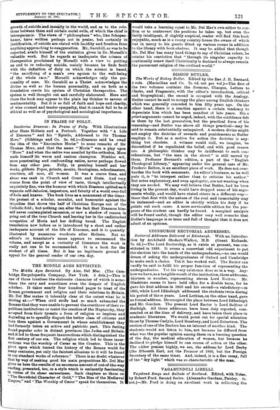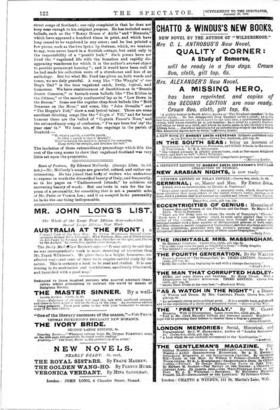VAGABUNDITLI LIBELLI.
street songs of Scotland ; our only complaint is that he does not keep near enough to his original purpose. He has included mans ballads, such as the "Bonny House o' Airlie " and " Binnorie," which have appeared a hundred times in print, and which have long ceased to be vagabond in any sense; and he has printed a few pieces, such as the two lyrics by Outram, which, we venture to say, were never heard in a Scottish cottage, but exist only in the respectability of a " prentit built." Such poems have not lived the "vagabond life with the homeless and rapidly dis- appearing wanderers for which it is the author's avowed object to provide permanent housing "; and it would have been well if he had made his collection more of a storehouse and less of an anthology. But for what Mr. Ford has given us, both words and tunes, we are duly grateful. A song like "The Waggin' o' our Dog's Tail" is the true vagabond catch, lively, topical, and humorous. We have reminiscences of Jacobitism as in "Bonnie Jeanie Cameron," or barrack-room ballads like "The Eilties in the Crimea," or the merely sentimental lay as in "Low Down in the Broom." Some are the regular chap-book ballads like "Bold Brannan on the Moor," and some, like "John Grumlie " and "The Hoggie's Tub," show a real lyrical talent. There are some excellent drinking songs like the " Cogie o' Yill," and for broad humour there are the ballad of "Captain Fraser's Nose," and the extraordinary song of confession, "I've aye been ion' sin' the year cam' in." We hear, too, ef the ongoings in the parish of Dunkeld :— "0, what a parish, a terrible parish, 0, what a pariah is that o' Dunker !
They've hangit the minister, droon'd the precentor, Deng down the steeple, and dracken the bell."
The laudation of these extraordinary proceedings which fills the rest of the song seems to show that vagabond Scotland was very little set upon the proprieties.



















































 Previous page
Previous page